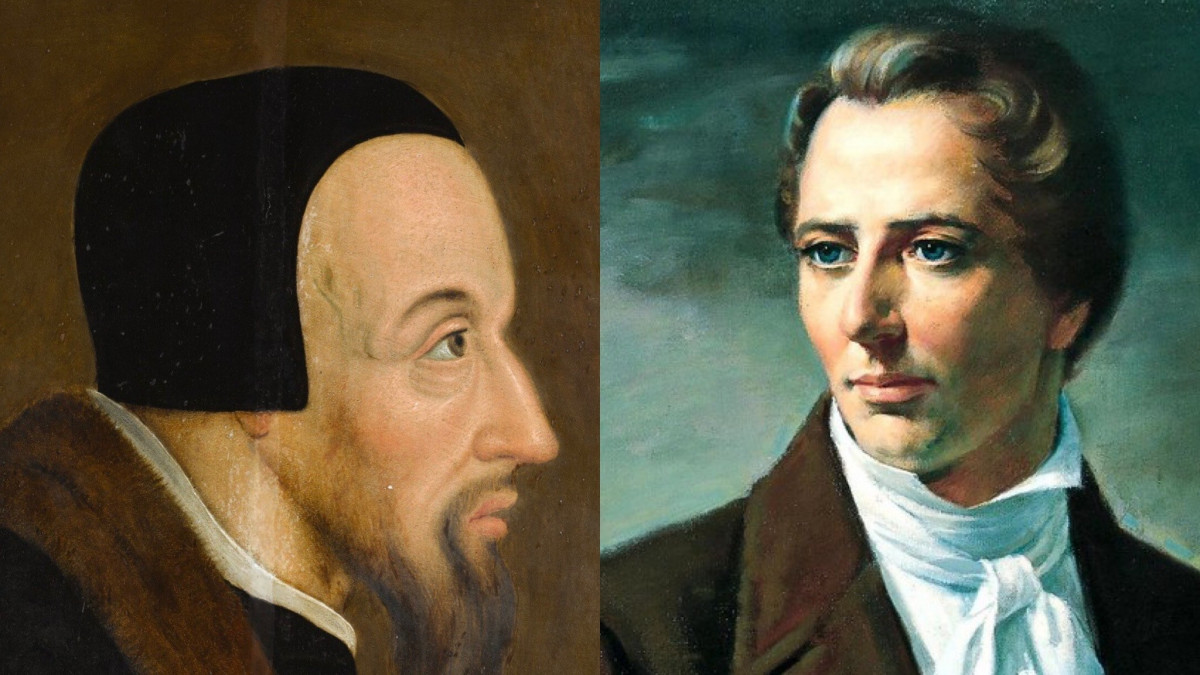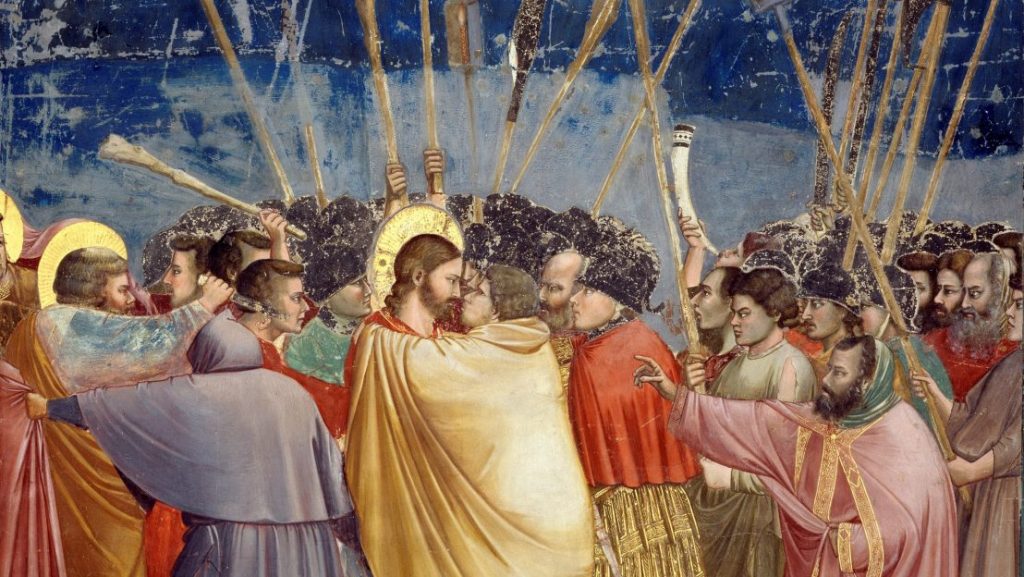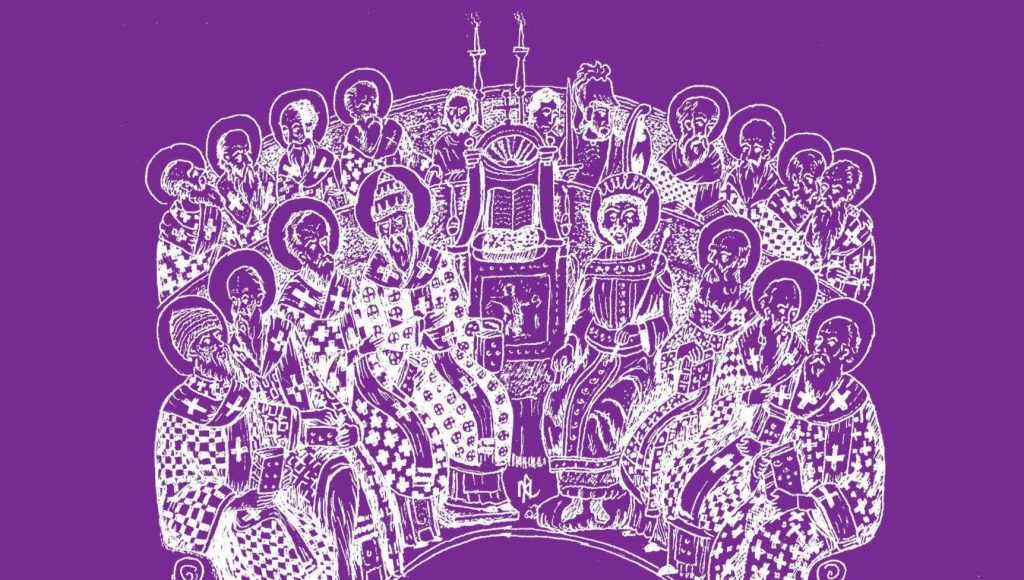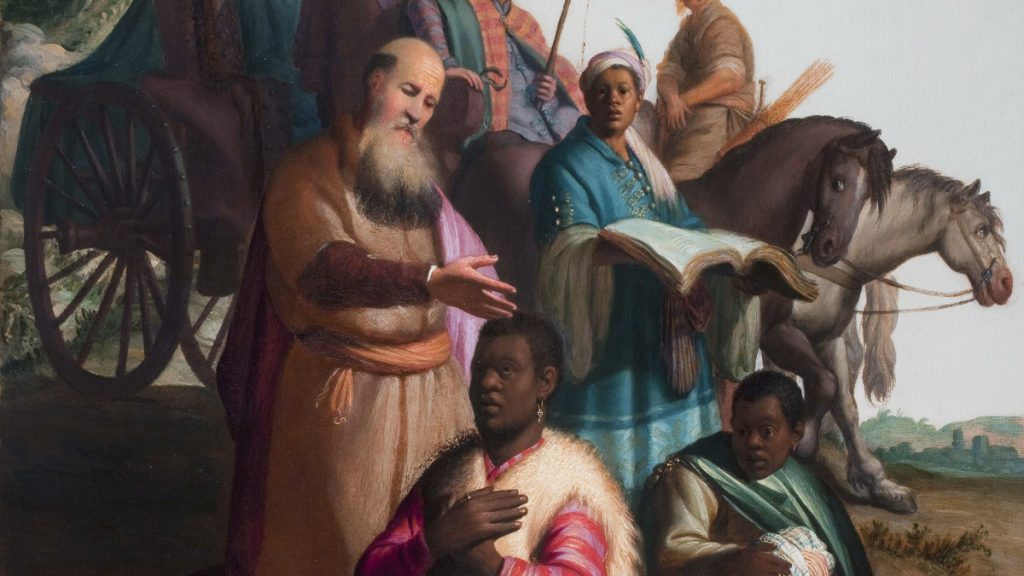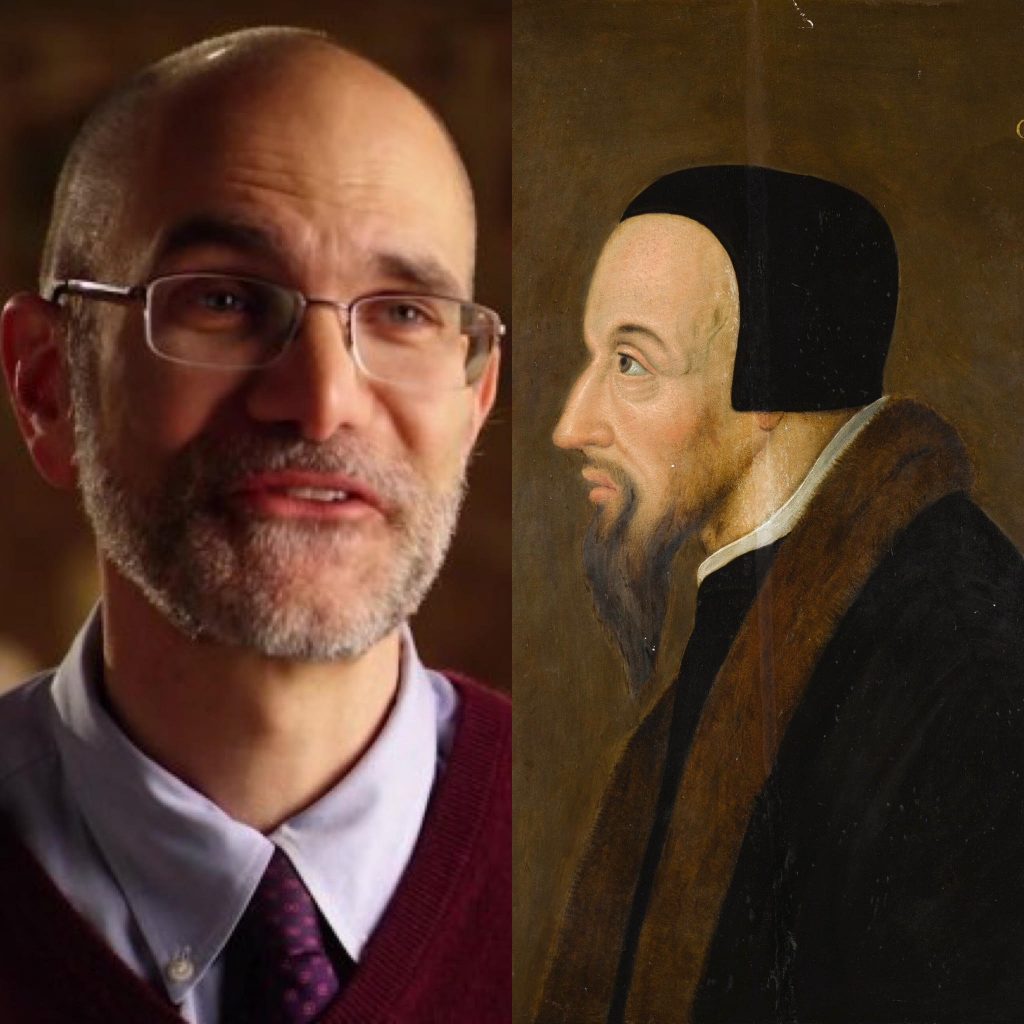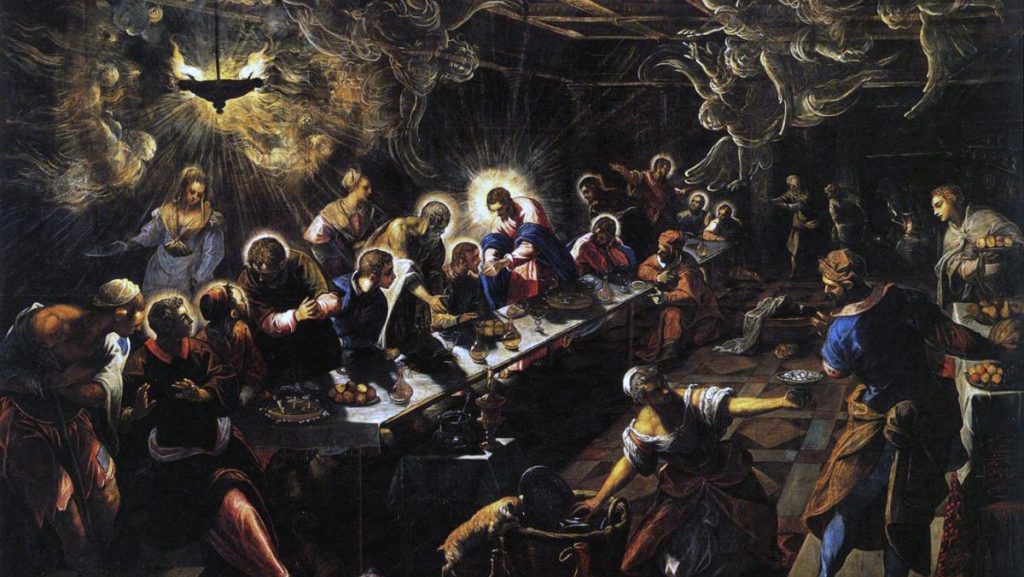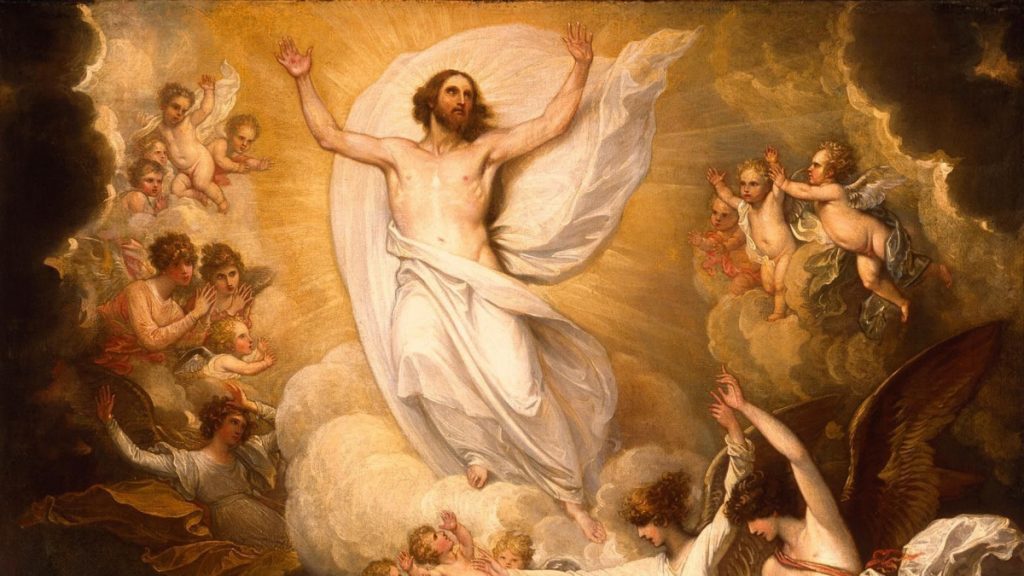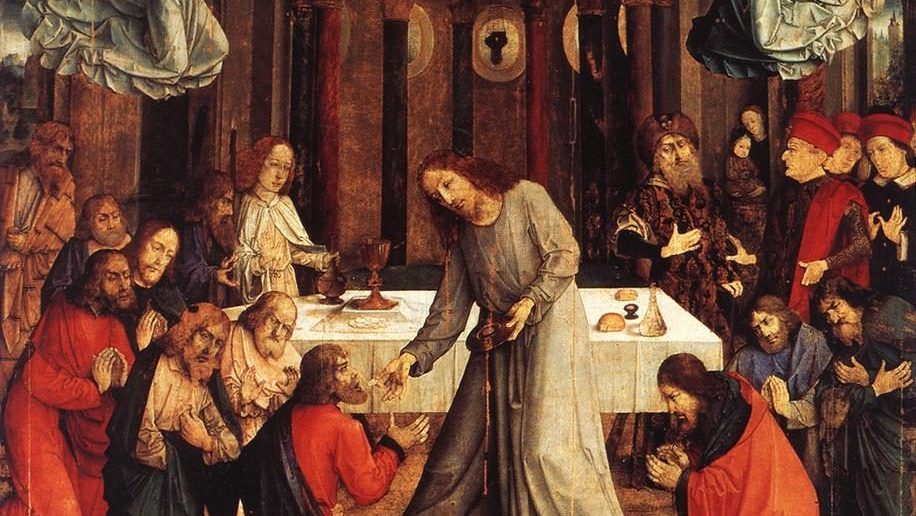This Becoming Catholic entry is slightly adapted from a three-part series published on Catholic Answers in August 2023. Here is Part 1, Part 2, and Part 3.
Roadmap
Our Roadmap is as follows:
- Our thesis is that John Calvin’s account of how Christians know the canon of Scripture is fundamentally gnostic. We will show this in three parts:
- Part 1: A Disturbing Discovery, will recount my initial discovery of Calvin’s account of the canon while I was still a protestant who was investigating Catholic claims. I will also define what I mean by “gnostic,” and how Calvin’s claims qualify; then
- Part 2: Gnostic Calvin, will show further evidence from his magnum opus, The Institutes of the Christian Religion, that Calvin’s approach to the canon of Scripture was indeed gnostic; and finally,
- Part 3: Calvin, and the Mormon “Burning in the Bosom,” will show how disturbingly similar Calvin’s appeal for his own canon is to the appeal many Mormons make for their own false scriptures.
Part 1: A Disturbing Discovery
It was late summer, 2017. I was a protestant who several months prior had begun reading the Church Fathers. Their seemingly ubiquitous belief in Catholic doctrines compelled me to dig into whether or not the Catholic Faith was true.
To that end, I had just begun reading St. Francis de Sales’s riveting apologetic against protestantism, The Catholic Controversy. I had heard that the book presented some of the best arguments against protestantism ever made. It was true: I was stunned by nearly every page, as so many questions I’d had for years were not only taken seriously, but given a serious answer by this zealous priest. Indeed, when it was originally written in the 16th century, it helped convert tens of thousands of protestants back to the Catholic Faith.
In his arguments, St. Francis often quoted protestants themselves—the men whom I had grown up seeing as my spiritual fathers. Although I had read a decent amount of Luther and Calvin in my high school and college days, many of the quotes presented in The Catholic Controversy shocked me, especially after several months of reading the Church Fathers.
Perhaps the single most shocking quote was of John Calvin explaining his teaching on the canon of Scripture—the list of books that ought to be considered part of the Bible.
In brief, I discovered that his teaching was thoroughly gnostic.
For the purpose of this article, I will define an article of faith as “gnostic” if it is imparted to the individual by God directly, i.e. privately. This is the opposite of a “public” article of faith, which God imparts to everyone by means of a duly authorized representative, i.e., apostolic (“sent”) authority.
The Christian faith has always been fundamentally public. Christ commissioned the apostles to disciple the nations, and in doing so, He gave them authority to teach, in a public fashion, articles of faith to be believed by all. When controversies arose about this faith, they were likewise resolved in public fashion for all (see the Council of Jerusalem in Acts 15, for example).
Thus, from the beginning, Christians could not claim that God gave them a personal revelation as a means to contradict, add to, or subtract from articles of faith publicly taught by the apostles and their successors as duly authorized representatives of God. If someone claiming to be Christian did make such an assertion, it would be fundamentally gnostic, as it would amount to the claim that the Christian revelation publicly imparted by authorized representatives had in fact been privately imparted directly to them. In this case, “privately” does not mean no one else is around. It simply means that they are claiming they received the revelation (i.e. the article of faith) directly, rather than from a public authority established by God.
This public nature of the Christian religion is evidenced all over Scripture. Perhaps the most significant example, as I previously mentioned, is the Council of Jerusalem, in Acts 15. When a theological controversy was “unsettling [the] minds” of Christians (v. 24), the apostles and presbyters they had already begun to appoint to succeed them settled the controversy with divine authority, declaring publicly, “For it has seemed good to the Holy Spirit and to us…” (v. 28), and then declaring their decision. Of the men who had initiated this controversy, they said, “We gave them no instructions” (v. 24).
All succeeding heresies down through the ages have followed the same pattern: a private individual or group of individuals, with no apostolic authority (or at least not sufficient authority to bind the whole Church), taught a new doctrine, and the authority of the Church publicly condemned it and re-articulated the truth for all (usually in a more refined and precise fashion in order to confront the new error).
The appeal of heretics is therefore always, in some sense, gnostic. The appeal of the true Faith, however, as it has been since the day of Pentecost, is always public.
St. Francis de Sales showed me that Calvin’s teaching on the canon of Scripture was entirely gnostic—and with it, the basis of my protestant religion, which had justified itself on the grounds of sola scriptura (“Scripture alone”).
For example, in Part 2, Article 1, Ch. 5 of The Catholic Controversy, St. Francis addresses the protestant assertion that the canon of Scripture consists of 66 books, rather than the Catholic 73. The books in question were from the Old Testament: Tobit, Judith, parts of Esther and Daniel, 1 and 2 Maccabees, Wisdom, Sirach (often referred to as Ecclesiasticus), and Baruch.
The protestants had eliminated these seven books (and other portions) from Scripture (or at least relegated them to a second tier they did not consider divinely inspired). The reasons why are not within the scope of my argument–and yes, among some Catholics, there remained some controversy over these 7 books, despite earlier declarations of the Church on their canonicity. But what intrigued me most was the protestant argument for the 66 book canon, which St. Francis addressed by quoting the Calvin-authored French Confession of Faith. I was shocked by what I read. The following is that statement of faith presented to the king of France by so-called “reformers.” After having placed on the list, in the third article, the books [of Scripture] they are willing to receive, they write as follows in the fourth article:
We know these books to be canonical and a most safe rule of our faith, not so much by the common accord and consent of the Church, as by the testimony and interior persuasion of the Holy Spirit, which gives us to discern them from the other ecclesiastical books.
I was not aware that a protestant leader as august as Calvin had ultimately relied on what he called “the testimony and interior persuasion of the Holy Spirit” to affirm his 66 book canon.
Given that I had grown up in a town with many Latter-Day Saints (Mormons), among whom were some of my closest friends, I was often exposed to their entreaties to read the Book of Mormon. They said that if I read it while asking God to reveal to me whether or not it was true, I would experience a “burning in the bosom” as confirmation, and would simply know that it was true. Myself, and every serious protestant I knew, considered such argumentation fallacious, at best. Who couldn’t make such claims about any particular text? It utterly subjectivized it.
That is why it struck me—by now, a beleaguered protestant—that Calvin was making the exact same sort of argument. I had always believed that if protestantism had any chance of being true, the “reformed” tradition had the most intellectual wherewithal to make it so. But here he was, the most “reformed” of the “reformed,” essentially falling back on a “burning in the bosom” argument in order to justify a biblical canon that differed from that of the Catholic Church.
I was so shocked by St. Francis de Sales’s quote of Calvin that I initially assumed it was a misquote—just Catholic propaganda, I thought, taken from a source St. Francis had never bothered to verify. The argument was simply too absurd. It couldn’t be that Calvin hinged his case for the 66 book canon on this “interior persuasion of the Holy Spirit.” To do so would make Calvin, and an essential article of his teaching, gnostic.
So I began looking for the source of the quote, and I was horrified to find that it was in fact genuine. St. Francis had cited it correctly, and its words were exactly as he had quoted them.
Here is how Article 4 of the 1559 French Confession of Faith justifies the 66 book canon, as included in a volume of creeds organized and edited by the reformed protestant theologian and historian, Philip Schaff:
We know these books to be canonical, and the sure rule of our faith, not so much by the common accord and consent of the Church, as by the testimony and inward illumination of the Holy Spirit, which enables us to distinguish them from other ecclesiastical books upon which, however useful, we cannot found any articles of faith.
My next defense mechanism was to assume that Calvin had been alone in grounding his argument for the 66 book canon on this “inward illumination of the Holy Spirit.”
Unfortunately, he was not. Virtually identical language is used nearly a century later in the 1647 reformed (i.e. Calvinist) Westminster Confession of Faith, subscribed to by many protestants to this day, justifying the same canon (Ch. 1, §5):
We may be moved and induced by the testimony of the Church to an high and reverent esteem of the holy Scripture; and the heavenliness of the matter, the efficacy of the doctrine, the majesty of the style, the consent of all the parts, the scope of the whole (which is to give all glory to God), the full discovery it makes of the only way of man’s salvation, the many other incomparable excellencies, and the entire perfection thereof, are arguments whereby it doth abundantly evidence itself to be the Word of God; yet, notwithstanding, our full persuasion and assurance of the infallible truth, and divine authority thereof, is from the inward work of the Holy Spirit, bearing witness by and with the Word in our hearts.
Nor was this the only protestant creed to make this argument. Article 5 of the 1561 Belgic Confession (later revised in 1619) used virtually identical language, as did Chapter 1, Paragraph 5 of the 1689 London Baptist Confession of Faith.
Thus, I discovered a horrible truth: not only was Calvin’s argument about the canon of Scripture essentially gnostic, but multiple protestant creeds, subscribed to by perhaps millions of protestants to this day, had followed him in making the same argument.
But the French Confession of Faith is not the only place where Calvin made this argument. He makes it at length in his magnum opus, the Institutes of the Christian Religion, whose final edition was published the same year, 1559.
Calvin specifically addresses the canon of Scripture in Book 1, Ch. 7, §2 of his Institutes:
As to the question, “How shall we be persuaded that it [the canon of Scripture] came from God without recurring to a decree of the church?” it is just the same as if it were asked, “How shall we learn to distinguish light from darkness, white from black, sweet from bitter?” Scripture bears upon the face of it as clear evidence of its truth, as white and black do of their color, sweet and bitter of their taste.
His argument thus amounts to this: you shall know the canon of Scripture because it is obvious what it is. In other words, “my argument is right, because it is obviously right”—so obvious that it can be compared to the difference between white and black, sweet and bitter. Calvin thus appeals to distinctions that are discernible to anyone whose senses are working properly.
But of course, that misses the point, which is that he simply assumes that his theological “senses” are working properly—an assumption for which he provides no argument.
Likewise, he ignores the millennia of saints, martyrs, Church Fathers, and councils who consistently identified as part of the canon of Scripture books he claimed were not. Thus, the necessary implication is that all of them lacked properly working theological “senses.” Otherwise, they would have been able to distinguish between “white and black,” “sweet and bitter,” with respect to the canon of Scripture. And if they could not so distinguish, what would that say about them versus Calvin?
Calvin continues his argument in §4, explicitly asserting that the basis for our certainty about the canon of Scripture cannot rely on anything public (which he associates with “human” authority), but rather from “the secret testimony of the Spirit”:
If, then, we would consult most effectually for our consciences, and save them from being driven about in a whirl of uncertainty, from wavering, and even stumbling at the smallest obstacle, our conviction of the truth of Scripture must be derived from a higher source than human conjectures, judgments, or reasons; namely, the secret testimony of the Spirit.
Thus, for Calvin, the canon of Scripture is known to those “who are inwardly taught by the Holy Spirit.” Arguments are not required. This alone, “the secret testimony of the Spirit,” is the ultimate basis for knowing the canon, and only those “who are inwardly taught” will receive this teaching. The teaching is from God Himself—and we know this because that is what those “who are inwardly taught” claim.
The argument is not only entirely private (i.e. gnostic), but completely circular.
Part 2: Gnostic Calvin
As I showed in Part 1, not only Calvin, but various protestant sects argued for the 66 book canon of Scripture on explicitly and undeniably gnostic grounds.
In Part 2, I will show just how thoroughly gnostic Calvin’s argument is by examining his Institutes of the Christian Religion, in which he doubles down on his claim that the means of knowing the correct canon of Scripture is the “inward illumination” and “secret testimony of the spirit.” I will simply point out again, that no serious protestant I knew or had heard of would consider such appeals as anything more than laughable with respect to any other doctrine. But here I was, at one of the prime fountainheads of protestantism, on what he claimed was the sole infallible rule of faith (i.e. Scripture), and he was speaking and thinking like a gnostic.
In addition to this, Calvin also disclaimed the need for the witness of others (i.e. the Church) to any particular canon of Scripture. He wrote as follows in the Institutes (Book 1, Ch. 7, §5):
Let it therefore be held as fixed, that those who are inwardly taught by the Holy Spirit acquiesce implicitly in Scripture; that Scripture, carrying its own evidence along with it, deigns not to submit to proofs and arguments, but owes the full conviction with which we ought to receive it to the testimony of the Spirit.
Enlightened by him, we no longer believe, either on our own judgment or that of others, that the scriptures are from God; but, in a way superior to human judgment, feel perfectly assured—as much so as if we beheld the divine image visibly impressed on it—that it came to us, by the instrumentality of men, from the very mouth of God.
Not only does Calvin claim that knowing the correct canon comes through an “inward illumination” of the “secret testimony of the spirit,” but this “illumination” is taught “in a way superior to human judgment.” Note once more the sleight of hand: Calvin simply labels the judgment of the Church as to the canon “human judgment,” but his own judgment he labels the “inward illumination” of the Holy Spirit which he then declares “superior to human judgment.” Yet he has made zero argument for why we should believe that his “inward illumination” is from God, whereas the judgment of the Church is a merely “human judgment.” The devil truly is in the details, all of which Calvin assumes rather than argues for.
Calvin thereby not only claims that the knowledge of the canon comes in a gnostic fashion, but has locked the individual inside his own ego—an ego superior to all external witness and authority. The canon is no longer a public revelation imparted by God by means of duly authorized representatives (i.e. apostolic authority), as the Christian faith had always been understood to be. Rather, it is an “inward illumination” that requires no witness from others, no duly authorized representative, and no public testimony to its veracity. Quite contrary to many of his claims about the necessity of ecclesial authority (which was virtually always his personal authority), and its role in speaking for Christ, when it comes to the canon of Scripture, Calvin argues and maintains his ground like a gnostic.
What can justify this? Apparently just the word of Calvin, and his purely subjective conviction that he (and those who agree with him) are “enlightened” by God.
Incidentally, whereas Calvin claims that only the elect receive this “inward illumination,” many of those who agree with him on the canon (i.e. other protestants) vehemently disagree with him on other doctrines he claims are necessary for salvation. One wonders why God would give an “inward illumination” to the “elect” to know with perfect and unchallengeable certainty the canon of Scripture, but not the actual doctrines it supposedly taught. Calvin never addresses such blatant incoherence.
The next few sentences of the same section make his gnostic approach even clearer:
We ask not for proofs or probabilities on which to rest our judgment, but we subject our intellect and judgment to it as too transcendent for us to estimate. This, however, we do, not in the manner in which some are wont to fasten on an unknown object, which, as soon as known, displeases, but because we have a thorough conviction that, in holding it, we hold unassailable truth; not like miserable men, whose minds are enslaved by superstition, but because we feel a divine energy living and breathing in it—an energy by which we are drawn and animated to obey it, willingly indeed, and knowingly, but more vividly and effectually than could be done by human will or knowledge.
Hence, God most justly exclaims by the mouth of Isaiah, “Ye are my witnesses, saith the Lord, and my servant whom I have chosen, that ye may know and believe me, and understand that I am he” (Isa. 43:10).
This is a remarkable statement from a man who claimed to be “reforming” the Church.
First he disclaims entirely the need for arguments—“proofs or probabilities,” as he says—a strange assertion for a man writing a treatise hundreds of pages long explaining why his particular doctrines should be believed. He asserts that his conclusion is based on truth that is “too transcendent for us to estimate.” Upon what basis does he claim this? We don’t know. He denies that he owes anyone any arguments.
But he then proceeds to make one: his 66 book canon of Scripture is correct because he and those of his persuasion “have a thorough conviction” that it is “unassailable truth.” Those who disagree with them are enslaved to “superstition,” he claims. He and his followers, on the other hand, are not merely certain of their conviction, but “feel a divine energy living and breathing” in the canon they have identified—a remarkable appeal to what can only be described as a sort of physical or emotional sensation.
The fact that so many Christians throughout the ages had included other books in the canon of Scripture never seems to enter Calvin’s mind. These great saints could no doubt, likewise, claim to experience “an energy by which [they] are drawn and animated to obey it [Scripture], willingly indeed, and knowingly, but more vividly and effectually than could be done by human will or knowledge.” Yet they often believed that the canon of Scripture included seven additional books that Calvin excluded.
So which one is right? Those with the stronger “thorough conviction that, in holding it, we hold unassailable truth”? But even by this supposed “standard,” would not the conviction of so many centuries of saints—among whom were countless martyrs—count on the scale far more than that of just Calvin, who was just one man at the head of a small sect, who did not die a martyr?
Calvin concludes his “argument” as follows:
Such, then, is a conviction which asks not for reasons; such, a knowledge which accords with the highest reason, namely knowledge in which the mind rests more firmly and securely than in any reasons; such in fine, the conviction which revelation from heaven alone can produce. I say nothing more than every believer experiences in himself, though my words fall far short of the reality.
I do not dwell on this subject at present, because we will return to it again: only let us now understand that the only true faith is that which the Spirit of God seals on our hearts. Nay, the modest and teachable reader will find a sufficient reason in the promise contained in Isaiah, that all the children of the renovated Church “shall be taught of the Lord” (Isa. 54:13). This singular privilege God bestows on his elect only, whom he separates from the rest of mankind. For what is the beginning of true doctrine but prompt alacrity to hear the Word of God?…
God having been pleased to reserve the treasure of intelligence for his children, no wonder that so much ignorance and stupidity is seen in the generality of mankind. In the generality, I include even those specially chosen, until they are ingrafted into the body of the Church.
Isaiah, moreover, while reminding us that the prophetical doctrine would prove incredible not only to strangers, but also to the Jews, who were desirous to be thought of the household of God, subjoins the reason, when he asks, “To whom has the arm of the Lord been revealed?” (Isa. 53:1). If at any time, then, we are troubled at the small number of those who believe, let us, on the other hand, call to mind, that none comprehend the mysteries of God save those to whom it is given.
The gnostic nature of Calvin’s argument could not be clearer, as he applies it not only to the canon of Scripture, but to the Christian faith itself. It bears a disturbing resemblance to religious and secular ideologies of succeeding centuries that disavowed the need for reason, argument, and logic to defend their positions.
Calvin speaks of “knowledge in which the mind rests more firmly and securely than in any reasons”—a gnostic claim that cannot be countermanded.
Calvin describes this knowledge this way: “Every believer experiences in himself.” So now “experience” is the criterion of dogmatic veracity—just not, apparently, the “experience” of countless generations of Christians over the preceding 1,500 years that contradicts him on the canon (and much else). And who can ever contradict that which is experienced “in himself”? No one.
Calvin says to whom this knowledge is given: “This singular privilege God bestows on his elect only, whom he separates from the rest of mankind…God having been pleased to reserve the treasure of intelligence for his children.” So once again, every one of the countless Christians and saints who identified a different canon from Calvin are apparently not among the “elect” or the “children” of God—not among those “specially chosen”—even while those who apparently qualify (those who agree with him on the canon, i.e. other protestants) are at the same time at odds with Calvin on many other doctrines.
Should Calvin or those who follow him be disturbed at how few have ever believed anything like what he proposes? No, he says, because “none comprehend the mysteries of God save those to whom it is given.”
Calvin has thus sealed off himself and the “elect” of his sect from not only the Christian public witness of apostolic authority from the first century onward, but from argument, reason, and logic, all while very selectively appealing to a set of subjective experiences.
It is impossible to imagine anything more circular and gnostic than this. Calvin claims that God reveals the canon only by an inward illumination of the individual, and then he locks the ego of that individual in a self-sealed container that has no need to appeal to any other witness, testimony, or authority, satisfied in the assertion that God speaks directly to him, but the perennial witness and authority of the Church is mere “human judgment.” The individual claiming to be among the “elect” thereby becomes “infallible” in his discernment of the canon, but the Church, apparently, is not. Recall that earlier he had said “that those who are inwardly taught by the Holy Spirit acquiesce implicitly in Scripture.” Thus, anyone who disagrees with Calvin, by this “logic,” would necessarily not be “inwardly taught by the Holy Spirit.” Convenient, and too bad for the 1,500 years of Christians who preceded him and his sect.
What could be more absurd than this? Is anything like this found in Christian history? For that matter, is anything like this found in Scripture?
The answer to the first question is “nothing,” and the answer to the latter two is a firm “no.” With respect to the canon, Calvin has invented his own religion in order to guarantee that he arrives at his own conclusion, and that religion is nothing less than a revival in various forms and degrees of a novel form of Gnosticism under a veneer of Christianity.
Part 3: Calvin, and the Mormon “Burning in the Bosom”
In Part 1 and Part 2, I described my shocking discovery, as a protestant, of Calvin’s gnostic argument for the canon of Scripture, as argued in the French Confession of Faith and his Institutes of the Christian Religion.
That was not the end of the matter. As I said in Part 1, I grew up in an area that had many Mormons—members of what they call the “Church of Jesus Christ of Latter-Day Saints,” or “LDS.” One of my dearest friends was even an LDS missionary.
When LDS evangelize, one of the key things they do is request that a prospective convert read the Book of Mormon, which they call “another revelation of Jesus Christ,” and ask God if it is true. Following Joseph Smith—the man they claim was a prophet—they appeal to James 1:5 for justification: “If any of you lacks wisdom, let him ask God, who gives to all men generously and without reproaching, and it will be given him.” They believe that God will reveal to you that it is true through what is often called a “burning in the bosom”—a direct revelation by the Spirit.
Sound familiar?
Another set of LDS scriptures, Doctrine and Covenants (9:8-9), describes this “burning in the bosom” as follows:
But, behold, I say unto you, that you must study it [the Book of Mormon] out in your mind; then you must ask me if it be right, and if it is right I will cause that your bosom shall burn within you; therefore, you shall feel that it is right.
But if it be not right you shall have no such feelings, but you shall have a stupor of thought that shall cause you to forget the thing which is wrong; therefore, you cannot write that which is sacred save it be given you from me.
How is this different from Calvin’s argument that “we feel a divine energy living and breathing in it”? What if—as often occurs—a Muslim or anyone else of another religion makes the same argument for the Quran or his respective scriptures?
Could actual God-breathed Scripture possibly evoke such experiences? Yes. The Catholic Church does not deny and has never denied this. But that is not the point. The point is that we must reconcile such dogmatic claims, and if there is no basis for doing so outside an appeal to an individual revelation, then the notion of public revelation binding on all humanity becomes absurd and untenable.
This LDS doctrine of a burning in the bosom was originally given to Oliver Cowdery, who assisted Joseph Smith in supposedly translating the Book of Mormon. The LDS have provided the following official commentary on this verse in a “Student Manual,” making clear that this burning in the bosom applies to others as well (since this link was originally included in this article, it has since been removed):
This process of receiving revelation can be of value to all Saints. President Joseph Fielding Smith explained that “a similar privilege is given to any member of the Church who seeks knowledge in the spirit of prayer and faith. The Lord will cause the feeling of security and truth to take hold of the individual and burn within the bosom, and there will be an overwhelming feeling that the thing is right…
When you have been listening to some inspired speaker who has presented a new thought to you, have you not felt that burning within and the satisfaction in your heart that this new thought is true? On the other hand, have you experienced the feeling of stupor, gloom, or uneasiness when some thought has been presented which was in conflict with the revealed word of the Lord, and you have felt by this manifestation of the Spirit that what was said is not true? It is a great gift, which all may receive, to have this spirit of discernment, or revelation, for it is the spirit of revelation” (Church History and Modern Revelation, 1:51).
Hence the common practice of LDS missionaries to ask people to read the Book of Mormon and request this burning in the bosom themselves.
Given my familiarity with this LDS method of “proving” their scriptures, when I saw Calvin’s arguments, I immediately detected the substantial similarity between his appeal to the “inward illumination of the Holy Spirit” by which he feels “a divine energy living and breathing in it” for his canon of Scripture, and the LDS appeal to the burning in the bosom for theirs.
How do the two differ? In reality, they don’t. Both are fundamentally circular and gnostic appeals that sidestep public apostolic authority, reason, and logic, for the sake of founding a new religion.
Though I had read a decent number of Calvin’s writings as a protestant, I had either never read—or perhaps never noticed—the blatantly gnostic argument for his canon of Scripture until, as I described in Part 1, St. Francis de Sales pointed it out to me. Calvin’s arguments are essentially indistinguishable from those of the LDS.
Let’s work this out in practice. If Person A appeals to an “inward illumination” for Canon A, and Person B appeals to a “burning in the bosom” for Canon B, and both of them claim this is from the Holy Spirit, and both disclaim the necessity of argument, history, and public authority, how are we to know which (if either) has the true canon of Scripture?
Person A and Person B don’t even have to be a Calvinist and a Mormon. They could be John Calvin and St. Augustine, or Martin Luther and St. Athanasius, or Ulrich Zwingli and St. Cardinal Bellarmine, or even one of the Church Fathers and one of the various local Church councils who occasionally had somewhat different canon lists among themselves. How can the right canon be identified not only for all Christians, but for all people to whom Christians are witnesses of the gospel?
There are only two possible answers to this question: a private appeal, or a public appeal; a gnostic appeal to “inward illumination”/“burning in the bosom,” or the public authority of a divinely authorized witness and teacher.
That public authority, that divinely authorized witness and teacher, is the Catholic Church, which was given the power to “bind and loose” (render judgment) by Jesus Christ.
Contrary to Calvin’s gross mischaracterization that the Church’s authority somehow “makes” what was not Scripture into Scripture by its declaration (an argument never once made by the Church), the authority of the Church rather recognizes Scripture, as St. John the Baptist, St. Peter, and others appointed by God recognized Jesus Christ as the Messiah, and upon this basis declared and taught His commandments with His authority to the rest of the world.
As God’s duly authorized representative on earth, the Church publicly declares to the world what the canon of Scripture is so that all may know it in a public manner, thereby guaranteeing them that what the Catholic Church teaches is the purpose of its Magisterium (teaching authority): “the objective possibility of professing the true faith without error” (CCC 890).
So long as anyone can appeal to the inward illumination or burning in the bosom of the “Holy Spirit” as their source for any article of faith, then the possibility of public religion is gone. Christianity becomes essentially gnostic from that moment forward—a matter of private individuals claiming to have received an inward illumination from God (given only to God’s “elect,” of course), hoping to convince other private individuals through what can only be described as self-authentication.
Think about it: for what reason did Christ appoint the Apostles and give them authority to teach at all if articles of faith could be known by the individual through a direct revelation from God without appeals to public authority, argument, or reason? None of it makes sense.
Conclusion
This common protestant approach to the canon of Scripture, exemplified in all its horror by Calvin, laid the theological groundwork for the spirit of our age. What began as “self-authentication” in religious dogma quickly became “self-authentication” in philosophy (“I think, therefore I am,” which came from the heterodox Catholic philosopher Rene Descartes), then morals, and now even one’s own sex. “Self-authentication” of the canon of Scripture laid the theological and philosophical foundations for appeals to “my truth.”
These are the fruits–quite contrary to their intentions–of a process in large measure catalyzed by Calvin and his ilk. Calvin did not recognize the profound incoherence of his own position. Those who followed in his footsteps have thereby been condemned to witness, without understanding, a civilizational degeneration that simply took the logic of their own theology many steps further than they were willing to go themselves.
However, we may all rest assured that the one true religion, the Catholic faith, far from relying on the gnostic appeals of a self-authenticating “elect” to individualized revelation, appeals instead to the public witness, history, and authoritative teaching of Christ’s Catholic Church, the “city on a hill that cannot be hidden” (Matt. 5:14), over what has now been 2,000 years.
